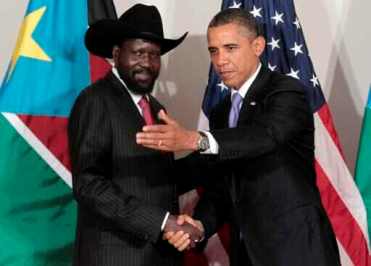South Sudan downplays lack of direct communication with US
July 30, 2014 (JUBA) – South Sudan has downplayed the significance of the lack of direct communication between president Salva Kiir and his US counterpart, Barack Obama, saying the latter should be more concerned over the situation due to his country’s heavy involvement in world affairs.

“Yes, it has been long time … but I think it is the president of United States who should be more concerned because it is America which is more concerned with the world affairs,” presidential spokesperson Ateny Wek Ateny told Sudan Tribune on Monday.
He was reacting to reports that president Kiir had complained that Obama had stopped calling him amid growing diplomatic tensions between Juba and Washington.
Kiir was quoted earlier this month during a visit to the capital of Western Bahr el Ghazal, Wau, questioning why Obama had failed to call him even at the height of the current conflict, which erupted in mid-December last year.
“I know my brother Obama is very busy with world affairs and I know how difficult it is to wear several hats at [the same] time but sometimes he manages to call others. He used to do that before but this has stopped. I don’t know [if] it is the level of his engagement with the world affairs that has preoccupied him,” Kiir was quoted as saying.
The president reportedly made the remark at a meeting with Bahr el Ghazal elders in Wau, during which he revealed the United States and other countries had cut financial support to the country’s security forces and withdrawn funding to several development projects, including construction of the Rajaf police academy.
“The friends that we know have stopped supporting us, even the United States, which used to provide support in capacity building such as governance, health, infrastructure and the security sector and also education has stopped,” Kiir told elders at the time.
Government troops loyal to Kiir and rebel forces aligned with former vice-president Riek Machar have been engaged in armed conflict since a political split in the ruling SPLM sparked violence across the country.
Kiir said the “senseless” war had also affected oil production, telling elders to tighten their belts until the conflict was resolved.
According to Ateny, talks between the two heads of state in the past had typically focused on bilateral issues and other matters of mutual interest.
It is unclear what caused the stoppage in direct communications between the two presidents, although independent observers say it is an indication of the level of frustration felt by Western governments with the Juba administration’s inability to curb the country’s ongoing conflict.
(ST)
